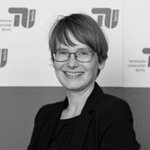Symposium Modern Emancipation (Emancipation I) – Guests

Priya Basil
Priya Basil was born in London to a family with Indian roots, she grew up in Kenya and now lives in Berlin. Her novels have been nominated for numerous awards. She regularly writes essays for Lettre International and various daily newspapers. Basil is a co-founder of Authors for Peace. In 2017, she launched a campaign for an official European Holiday across Europe. Her book “Gastfreundschaft” is published by Suhrkamp/Insel in March 2019.

EBOW
Ebow first attracted attention through guerrilla performances in laundromats, supermarkets and trams. Today, the artist, who lives and works in Vienna and Berlin, performs on more conventional stages, but her message remains provocative and political. Solo, but also as a member of the Gaddafi Gals, she raps against sexism, racism and homophobia, for an open, solidary and equal society.
More at: ebowsbazar.de

Birte Förster
Birte Förster studied History and German Philology at the University of Cologne and the Università degli Studi di Bologna. She received her doctorate in 2008 from the Justus Liebig University of Gießen with a thesis on the media history of the Queen Luise myth from 1860 to 1960. From 2008 to 2017, she was a research assistant at the Institute of History at TU Darmstdt, where she worked on the topic “Koloniale Machtspeicher. British and French Infrastructure Projects in Africa, 1920-1970”. Until 2016, she was the editor of the review journal “Neue Politische Literatur” there. From October 2017 to March 2019, she represented the professorship of Modern and Contemporary History at the University of Bremen. Her research was supported by scholarships from the Ev. Studienwerk Villigst, the DAAD and the Gerda Henkel Foundation. Since April 2019, Birte Förster is a PostDoc in the DFG/ANR project “Retrieving Alternatives. Pluralism in Practice in European Psychiatry, 1950-1980”. More at: https://www.reclam.shop/detail/978-3-15-011181-9/Foerster__Birte/1919 and https://medizingeschichte.charite.de/metas/person/person/address_detail/fleischbein_brinkschulte/

Sabine Hark
Sabine Hark, Professor of Interdisciplinary Women’s and Gender Studies, heads the Centre for Interdisciplinary Women’s and Gender Studies (ZIFG) at the TU Berlin. Her main areas of focus: Feminist and Queer Theory; Political Sociology and Theory; Sociology of Knowledge and Higher Education Research; latest book publication (together with Paula-Irene Villa): Unterscheiden und herrschen. An essay on the ambivalent entanglements of racism, sexism and feminism in the present.

Petra Hlaváčková
Petra Hlaváčková is a gender activist, curator, consultant as well as documentary filmmaker from Brno/CZ, focusing on feminist art theory, gender issues, gender politics and architecture, feminist urban planning and teaches at the Academy of Arts, Architecture and Design in Prague. She researches and consults in the field of gender equality as well as in the question of gender in relation to public space. Hlaváčková works as a commentator and critic for various magazines and newspapers, including A2, artalk.cz or Art+Antiques. She is also the author of the Brno Architecture Manual – an architectural guide for the years 1918-1945 (www.bam.brno.cz), one of the founders of the 4AM Forum for Architecture and Media association, where she organised the exhibitions Compact City, Art and Liberation. Europe 1943-1967: Revolting People, and the Move the City lab for improvisational dance and movement in relation to architecture and public space. She is the author and curator of the research project Kill Your Idol – Psychoanalysis of contemporary architecture of the City of Brno. Hlaváčková has lectured on feminist art history and modern architecture at the Institute of Art History of the Faculty of Art at Masaryk University Brno. She is also a member of the independent platform Guerilla.film and co-founder of the online magazine Artalk.cz, with a focus on contemporary art and architecture.

Kateřina Lišková
Kateřina Lišková, Ph.D. is Professor of Gender Studies and Sociology at the Czech Masaryk University in Brno. Her research is mainly devoted to gender, sexuality and the social order of intimacy, especially in Central and Eastern Europe. As a Marie Curie Fellow, Lišková was at Columbia University in New York and the Technische Universität Berlin, and previously as a visiting scholar at New York University and a fellow of the Imre Kertész Kolleg in Jena. Her research has been published under the title Sexual Liberation, Socialist Style: Communist Czechoslovakia and the Science of Desire, 1945-89 by Cambridge University Press. More at http://sexocom.fss.muni.cz and https://muni.academia.edu/KaterinaLiskova

Aline Oloff
Aline Oloff is a post-doctoral researcher at the Centre for Interdisciplinary Women’s and Gender Studies at the TU Berlin and co-editor of the journal feministische studien. Her research interests include feminist theory and the history of feminism and women’s movements. Relevant publication: The Language of Liberation. Women’s Movement in Postcolonial France, transcript 2018.

Martina Pachmanová
Martina Pachmanová is a professor of art history and theory at the Academy of Arts, Architecture and Design in Prague. As a scholar, author and curator, she specialises in gender politics and feminism in modernism, the post-war period and as an object of contemporary art and visual arts. Her publications include three exhibition-accompanying monographs on the forgotten modernist Czech women Milada Marešová (2008), Marie Galimberti-Provázková (2011) and Vlasta Vostřebalová Fischerová (2013). In addition, Pachmanová has published numerous essays and books in which she has participated as author or editor. These include Mobile Fidelities: Conversations on Feminism, History, and Visuality (Prague 2001); Unknown Territories of Czech Modern Art: Through the Looking Glass of Gender (Prague 2004); The Birth of a Woman Artist from the Lemonade Foam: Gender Contexts of Modern Czech Art Theory and Criticism (Prague 2013).

Mary Pepchinski
Prof. Dr.-Ing. Mary Pepchinski studied art history at Barnard College and architecture at Columbia University in New York/USA and did her doctorate at the University of the Arts in Berlin on women’s exhibitions, public space and civic discourse in the German Empire. After working as an architect in New York for five years, she was a research assistant at the architecture faculty of the Technical University of Berlin and was appointed professor for the design of high-rise buildings at the Dresden University of Applied Sciences in 1993. Pepchinski was a visiting professor at the Faculty of Architecture at the Graz University of Technology for Women’s History and Gender Studies and at the Mainz University of Applied Sciences for Women’s and Gender Studies. Since September 2018, she has been teaching architectural theory as part of the professorship for architecture and society at the Faculty of Architecture at the Technische Universität Dresden. Her research focuses on women architects in the 20th century, as well as modernist architecture and urbanism; landscape and architecture; photography and architecture; and architectural criticism on current buildings. In 2017, she was academic advisor for the exhibition “Woman Architect. For more than 100 years. Women in the architectural profession” at the Deutsches Architekturmuseum (DAM), Frankfurt/Main.

Sarah Rivière
Sarah Rivière is a British-German architect and architectural researcher who lives and works in Berlin. In her Berlin-based architectural practice, she designs and builds buildings that are attuned to people, the environment and conditions of use. Her working method combines new technologies for ecological building with socially responsible architecture. In addition to her practical work, Sarah Rivière conducts research in the field of architectural theory. In this context, she produces self-made animated short films that expand our understanding of future cooperative living together. Sarah Rivière also publishes in architectural journals, most recently with an article on “Stasis: Charging the Space of Change” in the Footprint Journal (TU Delft), special issue, Spaces of Conflict. Sarah Rivière currently teaches at the Institute of Architecture at TU Berlin: in the summer semester 2019, she led the master’s project Frau Architekt with Matthäa Ritter-Wurnig; in the coming winter semester, she will lead the master’s project Oral History: Berlin Women Architects with Professor Schlimme.

Gudrun Sack
Gudrun Sack works as a freelance architect and restorer with a focus on anchoring qualities and innovations in housing, public buildings and existing buildings, sustainable planning and building, and promoting good architecture in public perception. She is a partner at NÄGELIARCHITEKTEN, on the board of Netzwerk Berliner Baugruppen Architekten, has been a member of the board of the Berlin Chamber of Architects since 2017 and has been a member of the Sustainable Planning and Building Committee since 2005.

Christina Thürmer-Rohr
Christina Thürmer-Rohr, Dr.phil., Dipl.Psych. and Professor (emer.) at the Technical University of Berlin in the Department of Education, founded the Women’s Studies / Feminist Theory specialisation there in 1976. She has held guest professorships at the universities of Fribourg/Ch (on Hannah Arendt’s political theory) and Salzburg / Austria (gender research). In 2003, Thürmer-Rohr, together with Laura Gallati, founded the Forum akazie3 e.V.: Exercises in Political and Musical Thinking (http://forumakazie3.de). She has published numerous articles on the critique of patriarchy, women’s complicity and Hannah Arendt’s political thought. Currently in print: Fremdheit und Freundschaft – Essays, transcript Verlag Oct. 2019.


















